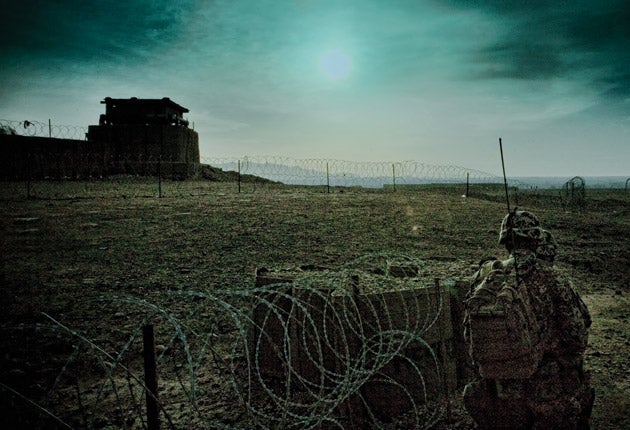Armadillo, Janus Metz, 100 mins (15)
A documentary following a Danish platoon in Helmand has triggered a government inquiry

I must admit, when I saw the new documentary Armadillo, I had barely been aware of Denmark's involvement in Afghanistan.
But, given the film's impact in its own country – where it was a box-office hit, and prompted an official inquiry into the events depicted – it seems that the Danes found it something of an eye-opener too.
Director Janus Metz and cameraman Lars Skree spent six months embedded with a Danish platoon in Helmand province, Afghanistan in 2009. We meet the young soldiers as they enjoy a pre-tour party with strippers; we see them leaving loved ones at the airport; then flying to their post at a base named Armadillo. Commanding officer Rasmus gives them a warm welcome: "The Taliban are on the ball ... you can count on some action, I promise you it'll be interesting" (you wonder how much of this rhetoric is for the men's benefit, how much for Metz and Skree).
Much of what the film-makers observe is undramatic. The soldiers perform routine patrols, watch porn and play video games that are livelier simulations of the war situation they're actually in. They know the Taliban are around, but they have no idea how to identify them. When the soldiers ask some local men for their co-operation, one Afghan reasonably points out that it wouldn't be to his advantage: "You come with all your weapons, then you leave." And then? "The Taliban will come and cut my throat."
We also see one Dane having an amicably uncomprehending encounter with a group of boys, failing to realise that (as subtitles reveal) they are royally taking the piss out of him.
Then matters take a dark turn. A detachment heads out to engage with some Taliban, and five Afghan men are soon dead in a ditch, apparently wounded by a Danish grenade, then summarily killed off with rifle fire. We see the soldiers pulling weapons off the bodies, inanimate shapes lying in bloody water. Metz edits out the dead Afghans' faces with digital blurs, but this is all the dignity they're deemed to be entitled to: "If you've slaughtered animals," one soldier comments, "this is no big deal'." Back at base afterwards, it's all hugs and high fives. At the debriefing, one soldier reports, "we liquidated them in the most humane way possible" – at which point we hear a distinct cackle from one of his comrades.
Then Rasmus informs his men that someone among them has spilled the beans to his parents back home – who have informed the military authorities. Oddly, however, during such extremely compromising discussions, no one mentions the film-makers, or visibly reacts to the camera. Did the soldiers forget that Metz and Skree were present – or did they just get so used to them that they effectively ceased to be outsiders? (The film-makers did, after all, risk their lives, just like their subjects.)
Unlike Restrepo, last year's documentary about United States troops in Afghanistan, Armadillo presents itself not as vérité-style reportage but as intensely "cooked", styled cinema. The editing opts for brisk cutting rather than long takes, and the imagery is often poetic, with a dash of Apocalypse Now in shots of a chopper hanging in a toxic yellow sky.
While there's no commentary, there's nevertheless implicit editorialising: at one point, Metz cuts directly, and unsubtly, from a computer war game to an actual mortar going off. And the score is heavy-handed in flagging up ironic discrepancy, pitching sombre strings to the men's bonhomie.

Watch Apple TV+ free for 7 days
New subscribers only. £8.99/mo. after free trial. Plan auto-renews until cancelled

Watch Apple TV+ free for 7 days
New subscribers only. £8.99/mo. after free trial. Plan auto-renews until cancelled
This self-conscious cinematic approach makes you feel, confusingly, that you're watching a real-life version of The Hurt Locker – which was a fiction that went all out to simulate documentary authenticity. Perhaps Metz simply feels that lo-fi war documentary has been done to death. Or perhaps he specifically intends to blur the distinctions between real war and fantasy war – to suggest that the men of Armadillo Base are detached from the moral meaning of their actions because they perceive their experiences as a version of the war movies they've seen, the video war games they've played.
Armadillo doesn't condemn its subjects – these inexperienced young men pumped up on fear, boredom, peer pressure and incomprehension of the unfamiliar world they've been dropped into. What's really shocking, perhaps, is not so much the actions performed by some of these soldiers, as the fact that they seem more than equipped to sleep easy with the consequences: the film is less about Afghanistan than about the way young men's minds work in war today. A brief coda tells us what some of these soldiers will do next. Some are off on further tours of duty, others not, but the caption that really worried me, over one gawkily boyish youth, read (my italics) – "Mads wants to go back to Afghanistan."
Next Week:
Jonathan Romney strikes out across the North American prairie in Kelly Reichardt's pioneer tale Meek's Cutoff
Film Choice
Bernardo Bertolucci is the subject of a new retrospective at the BFI Southbank, London, through to May. Also on wider release is his 1964 Before the Revolution. Returning with a sci-fi mind-bender after his debut Moon, director Duncan Jones throws Jake Gyllenhaal into a time-warp conundrum in the ingenious Source Code.
Subscribe to Independent Premium to bookmark this article
Want to bookmark your favourite articles and stories to read or reference later? Start your Independent Premium subscription today.

Join our commenting forum
Join thought-provoking conversations, follow other Independent readers and see their replies